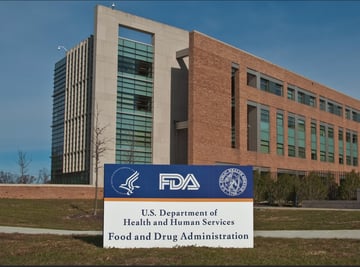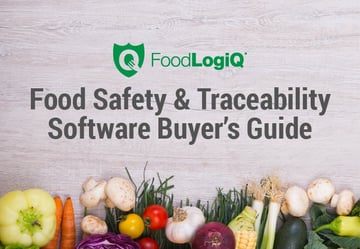Each year, companies lose millions of dollars to food recalls. While your company’s brand and reputation are on the line when it comes to pulling a potentially harmful product off the shelves, what’s even more important is the threat of harming the consumer if you don’t do it quickly and efficiently.
According to the Centers for Disease Control and Prevention, one in six people gets sick from foodborne diseases each year. In the early 2000s, the food industry experienced a significant number of incidents related to foodborne illnesses. This prompted the FDA to act in the form of the most sweeping reform in food safety history: FSMA.
The FDA Food Safety Modernization Act (FSMA) was signed into law in January 2011, better enabling the FDA to protect consumer health and strength the food safety system. The focus of FSMA was on preventative action – rather than response to food safety and quality problems – and it provided the FDA with new enforcement authorities to “achieve higher rates of compliance with prevention- and risk-based food safety standards and to better respond to and contain problems when they do occur.”
Over the past decade, Congress and the FDA have worked to create guidelines and documentation for building this improved food safety system, emphasizing the need for industry and government collaboration to ensure food safety and regulatory compliance.
FSMA 204 and Food Traceability
As the industry continues to take a more proactive approach to food quality and safety through FSMA guidelines and regulations, one ruling remains at top of mind for businesses and suppliers: food traceability.
The ability to identify a product at any point in the supply chain is crucial for companies and suppliers, particularly as it relates to consumer safety. This is covered under FSMA Section 204, titled “Enhancing Tracking and Tracing of Food and Recordkeeping.” The FDA was required to conduct pilot programs, access global standards, and further develop recordkeeping requirements, particularly for food products deemed high risk.
In September 2020, the FDA published a proposed rule for traceability under FSMA section 204. Food industry stakeholders provided over 1000 public comments that shaped the FDA’s perspective and updates were made to align with current industry practices for FSMA requirements.
The final rule was published in November 2022, and establishes traceability recordkeeping requirements for persons who manufacture, process, pack or hold foods included on the Food Traceability List (FTL). Data captured for certain activities in the supply chain at the lot level is represented by Critical Tracking Events, including harvesting, cooling, initial packing, first land-based receiver, shipping, receiving and transformation. Companies must also have a documented traceability plan, outlining their procedures to maintain the required records. The compliance date for all persons subject to the rule is Tuesday, January 20, 2026.
“At the core of this proposal is a requirement for those who manufacture, process, pack, or hold foods on the Food Traceability List (FTL) to establish and maintain records containing Key Data Elements (KDEs) associated with different Critical Tracking Events (CTEs).” - FDA
The Food Traceability List (FTL) identifies the foods for which additional traceability records are required. These recordkeeping requirements apply to the foods specifically listed on the FTL, and to foods that contain listed foods as ingredients, provided that the listed food that is used as an ingredient remains in the same form (e.g., fresh) in which it appears on the list. Ultimately, the requirements will help the FDA rapidly and effectively identify recipients of those foods to prevent or mitigate foodborne illness outbreaks to ensure a safer food system through a more standardized approach.
6 Steps to Prepare for FSMA 204
Now that FSMA 204 is finalized, companies and suppliers can take action:
- Ensure you and your team review and understand FSMA 204
- Know your role in the supply chain and the CTEs for which your company is responsible
- Assess current processes and systems to see what needs to be improved or changed
- Create a traceability plan for your organization
- Inform leadership of progress and ensure everyone is engaged internally
- Collaborate with trading partners, technology providers, and associations to make sure you’re prepared for compliance
FSMA 204 lays the foundation for end-to-end food traceability, extending beyond current recordkeeping regulations. Its implications for the food industry and on supply chain transparency and traceability cannot be overlooked or underestimated. As such, it’s critical for companies to leverage the right solutions to ensure swift, precise resolutions when action needs to be taken.
What Do You Need to Know About FSMA 204 Compliance?
- Tech-Enabled traceability is essential for competitive food businesses and provides business value beyond compliance and consumer protection
- Companies are at risk if they do not understand their role and approach to capturing and sharing enhanced traceability data for high-risk foods
- The traceability timelines are feasible with aggressive action on the planning and development of digital traceability programs
- Advanced traceability record keeping is here to stay, this is only the beginning
The Food Safety Modernization Act comprehensively aims to improve food safety and mitigate harmful impacts of hazardous food. Food safety and traceability are key components for every firm to properly manage and maintain. The broad scope of this mission can make it difficult for firms without industry-leading food safety and traceability software. Firms should consider partnerships that allow them to operate more efficiently and within FDA regulations.
Schedule Your Free FSMA 204 Consult Today
What steps are you taking to ensure FSMA 204 readiness? Request time with one of our experts to discuss key components of the FSMA 204 rule and how your brand can strategically prepare for the finalized regulation.
Tag(s):
Food Industry
,
Supplier Compliance
,
Recall
,
Food Safety
,
Traceability
,
Industry Regulations
Other posts you might be interested in
View All Posts
Food Industry
7 min read
| October 9, 2018
FDA Takes Commitment to Consumer Safety and Public Health to Next Level with New Food Recall Policies
Read More
Traceability
5 min read
| November 19, 2019
Food Safety & Traceability Buyer's Guide
Read More
Product Formulation
9 min read
| May 10, 2023

